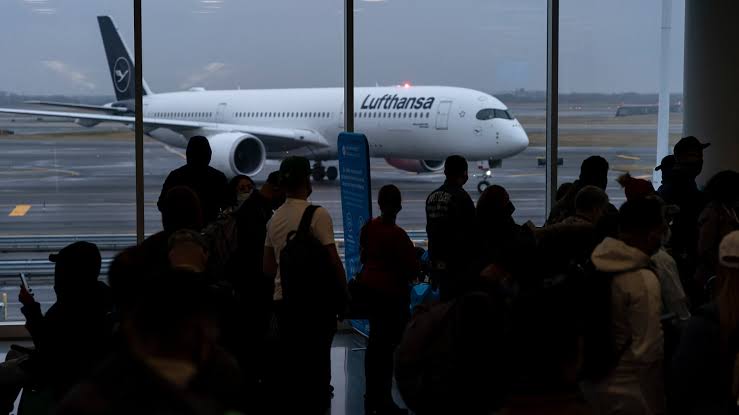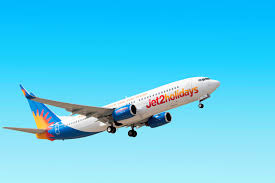Lufthansa fined record $4 million for discriminating against Jewish passengers
The fine is the largest the Transportation Department has ever issued against an airline.Germany’s flagship airline has been fined $4 million by the U.S. Department of Transportation over allegations it discriminated against a group of Jewish passengers.
The regulator said Tuesday that Lufthansa had prohibited 128 people wearing traditional Orthodox Jewish clothing from boarding for a connecting flight in Germany as they made their way from New York City to Budapest, Hungary, in May 2022.
Lufthansa Fined Record $4 Million for Discriminating Against Jewish Passengers
In a historic move, the U.S. Department of Transportation (DOT) has levied a record $4 million fine against German airline Lufthansa for discriminating against Jewish passengers. The ruling stems from a 2022 incident that the DOT concluded violated federal civil rights protections and targeted travelers based on religious appearance, not individual conduct.
This penalty marks the largest ever imposed by the DOT for civil rights violations involving an airline and has sparked intense debate about airline accountability, anti-Semitism, and the ethical treatment of passengers.
The Incident: Collective Punishment in Frankfurt
The controversy dates back to May 4, 2022, when a group of 128 passengers—many of whom were visibly Orthodox Jews—were flying from New York City to Budapest, with a layover in Frankfurt, Germany. The passengers were mostly individuals traveling independently to a religious pilgrimage in Hungary.
According to reports, several passengers on the first leg of the flight allegedly did not comply with Lufthansa’s mask mandate. Upon arrival in Frankfurt, Lufthansa made a sweeping decision: it barred all visibly Jewish passengers from boarding the connecting flight to Budapest. This included individuals who had not been involved in any misconduct, nor had any connection to the alleged violations.
Footage and passenger accounts revealed that Lufthansa staff informed passengers they were being denied boarding because they were part of “one group,” despite many of them traveling separately. One passenger captured a Lufthansa employee saying, “Everyone has to pay for a couple.” This blanket action triggered outrage within the Jewish community and beyond, as it was viewed as a clear case of collective punishment rooted in religious profiling.
—
Official Responses and Repercussions
The incident prompted immediate condemnation from advocacy groups, civil rights organizations, and religious leaders. The American Jewish Committee (AJC), Anti-Defamation League (ADL), and others demanded accountability and transparency from the airline. A DOT investigation was quickly launched following formal complaints filed by affected passengers.
On October 12, 2024, the DOT concluded its investigation, ruling that Lufthansa had indeed violated federal anti-discrimination laws. In a statement, U.S. Transportation Secretary Pete Buttigieg said:
> “No traveler should ever be subjected to discrimination based on religion, race, or ethnicity. This fine demonstrates our commitment to protecting the civil rights of every individual who boards an aircraft in or out of the United States.”
The $4 million penalty includes a $2 million direct fine and an additional $2 million credit for compensation already provided by Lufthansa to affected passengers. While the airline has not admitted to intentional discrimination, it acknowledged procedural failures and has agreed to implement sweeping changes to prevent future incidents.
In response to the ruling, Lufthansa issued an official apology:
> “We deeply regret the events of May 2022. Lufthansa does not tolerate discrimination of any kind. We acknowledge that mistakes were made in handling the situation, and we are committed to taking meaningful action to ensure this never happens again.”
As part of the settlement, Lufthansa will work closely with civil rights organizations to introduce anti-bias training, enhance cultural sensitivity programs, and update internal protocols for handling group travel and behavioral violations.
—
Broader Implications
This case has brought the issue of religious discrimination in the airline industry into sharp focus. Experts and civil rights advocates argue that the Lufthansa incident is not an isolated case but rather indicative of a broader, systemic problem.
Marc Stern, Chief Legal Officer for the American Jewish Committee, called the DOT’s ruling a “landmark decision” and noted:
> “This sends a clear message not only to Lufthansa but to the entire airline industry. Group punishment based on appearance, especially religious appearance, is unacceptable and unlawful.”
The case also underscores the difficulty of balancing security, compliance, and civil liberties in commercial air travel. Airlines are often required to enforce policies quickly and under pressure. However, critics argue that this cannot come at the expense of individual rights and protections.
Legal experts note that the fine could set a new precedent for how airlines and transportation companies are held accountable in civil rights matters. The previous highest DOT fine for a civil rights violation was significantly lower, making this a major step forward in regulatory enforcement.
Travelers’ rights advocates are now urging the Department of Transportation to issue clearer guidelines to all carriers on handling group travel, religious discrimination, and enforcement of onboard conduct rules without resorting to biased or collective action.
—
Moving Forward: Lufthansa’s Reforms and Industry-Wide Change
In the wake of the penalty, Lufthansa has announced several reform measures. These include:
Mandatory Anti-Bias and Cultural Competency Training: All Lufthansa customer-facing employees will undergo mandatory training, developed in collaboration with Jewish and civil rights organizations.
Policy Overhaul on Group Travel: The airline is revising its procedures for handling violations to ensure accountability remains with individuals and not presumed associations.
Internal Investigations Protocols: Lufthansa has committed to launching internal reviews of discrimination complaints more rapidly and transparently.
Civil rights groups have welcomed these changes but have emphasized the need for sustained oversight.
Transportation watchdogs are also calling on other carriers to review their own policies and prevent similar incidents. The case has already prompted discussions within industry bodies like the International Air Transport Association (IATA) about best practices in passenger relations and discrimination prevention.
—
Public Reaction and Jewish Community Response
The incident and subsequent fine have reverberated through both mainstream and Jewish media outlets. For many in the Jewish community, the events in Frankfurt evoked painful memories of historical injustices in Europe. Organizations like the ADL stated that the treatment of these passengers was “deeply concerning and reminiscent of discriminatory practices from a darker past.”
Social media was flooded with personal testimonies, videos, and calls for boycotts in the days following the incident. Prominent Jewish leaders in the U.S. and Europe praised the DOT’s firm response but stressed the importance of continued vigilance.
At the same time, many passengers affected by the incident expressed a mix of relief and lingering frustration. One passenger, who asked to remain anonymous, said:
It’s good to see justice served, but this was more than just a policy mistake—it was a moment that stripped us of dignity based on how we looked and what we believed.”
The $4 million fine against Lufthansa represents more than just a punitive measure—it is a signal that systemic discrimination, especially in public transportation, will not be tolerated. It highlights the responsibilities airlines have in treating every passenger with dignity, regardless of religion, ethnicity, or appearance.
As Lufthansa works to rebuild trust, the aviation industry at large must take note. The challenge moving forward will be not only to prevent such incidents but to ensure that policies and training reflect a deep respect for human rights and individual accountability.
This case has left an indelible mark on airline policy and civil rights law, reminding the world that even 30,000 feet in the air, justice must never be grounded.






